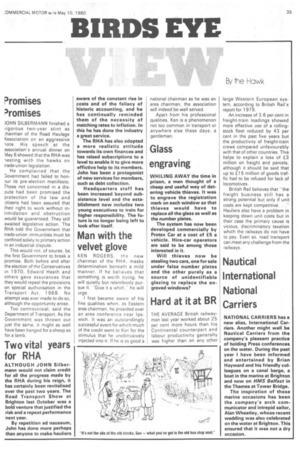BIRDS EYE
Page 37

If you've noticed an error in this article please click here to report it so we can fix it.
BY e -awk
Promises Promises
JOHN SILBERMANN finished a rigorous two-year stint as chairman of the Road Haulage ssociation on an aggressive -iote. His speech at the )ssociation's annual dinner on May 6 showed that the RHA was lesting with the hawks on lrade-union legislation.
He complained that the 3overnment had failed to honJur its pre-election manifesto. rhose not concerned in a dispute had been promised the protection of the law and citizens had been assured that their right to work without intimidation and obstruction ryould be guaranteed. They still awaited legislative action, The RHA told the Government that trade-union immunities must be confined solely to primary action in an industrial dispute.
This would not, of course, be the first Government to break a promise. Both before and after the election of the Conservatives in 1970, Edward Heath and others gave assurances that they would repeal the provisions on special authorisation in the Transport Act, 1968. No attempt was ever made to do so, although the opportunity arose.
Too controversial, said the Department of Transport. As the Government was thrown out just the same, it might as well have been hanged for a sheep as for a lamb.
Two vital years for RHA
ALTHOUGH JOHN Silbermann would not claim credit for all the progress made by the RHA during his reign, it has certainly been revitalised over the past two years. The Road Transport Show at Brighton last October was a bold venture that justified the risk and a repeat performance next year.
By repetition ad nauseum, John has done more perhaps than anyone to make hauliers aware of the constant rise in costs and of the fallacy of historic accounting, and he has continually reminded them of the necessity of matching rates to inflation. In this he has done the industry a great service.
The RHA has also adopted a more realistic attitude towards its own finances and has raised subscriptions to a level to enable it to give more effictive help to its members. John has been a protagonist of new services for members, such as debt collection.
Headquarters staff has been increased beyond subsistence level and the establishment now includes two young executives to train for higher responsibility. The future is no longer being left to look after itself.
Man with the velvet glove
KEN ROGERS. the new . chairman of the RHA, masks determination beneath a mild manner. If he believes that something is worth trying, he will quietly but relentlessly pursue it. -Give it a whirl,he will urge.
I first became aware of his fine qualities when, as Eastern area chairman, he presided over an area conference near Ipswich. It was an outstandingly successful event for which much of the credit went to Ken for the stimulus that he unobtrusively injected into it. If he is as good a national chairman as he was an area chairman, the associationwill indeed be well served.
Apart from his professional qualities, Ken is a phenomenon not too common in transport or anywhere else these days a gentleman.
Glass engraving
WHILING AWAY the time in prison, a man thought of a cheap and useful way of deterring vehicle thieves. It was to engrave the registration mark on each window so that thieves would have to replace all the glass as well as the number plates.
The system has now been developed commercially by Protex Car at a cost of £5 a vehicle. Hire-car operators are said to be among those interested in it.
Will thieves now be stealing two cars, one for sale under false number plates and the other purely as a source of unidentifiable glazing to replace the engraved windows?
Hard at it at BR
THE AVERAGE British railwayman last year worked about 25 per cent more hours than his Continental counterpart and labour productivity generally was higher than on any other large Western European system, according to British Rail's report for 1979.
An increase of 3.6 per cent in freight-train Loadings showed more effective use of a rollingstock fleet reduced by 43 per cent in the past five years but the productivity of freight-train crews compared unfavourably with that of other countries. This helps to explain a .loss of £.3 million on freight and parcels, although it should be said that up to £15 million of goods traffic had to be refused for lack of locomotives.
British Rail believes that -the freight business still has a strong potential but only if unit costs are kept competitive.
Hauliers also have a problem in keeping clown unit costs but in their case the primary cause is vicious, discriminatory taxation which the railways do not have to pay. Even so, road transport can meet any challenge from the railways.
Nautical International National Carriers
NATIONAL CARRIERS has a new alias, International Carriers. Another might well be Nautical Carriers from the company's pleasant practice of holding Press conferences on the water. During the past year I have been informed and entertained by Brian Hayward and his friendly colleagues on a canal barge, a boat in the marina at Brighton and now on HMS Belfast in the Thames at Tower Bridge.
The inspiration of these marine occasions has been the company's arch communicator and intrepid sailor, Alan Wheatley, whose recent wedding was also celebrated on the water at Brighton. This ensured that it was not a dry occasion.




















































































































